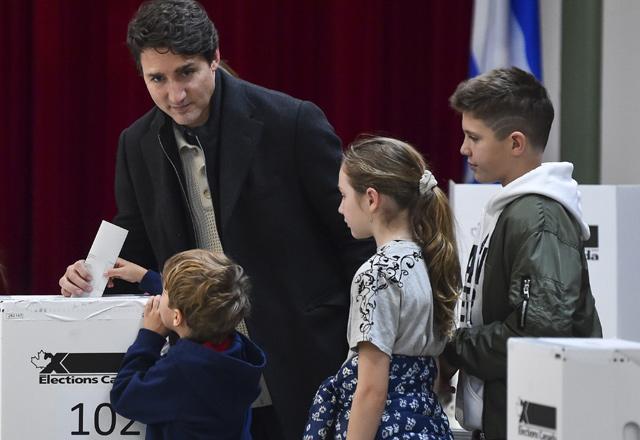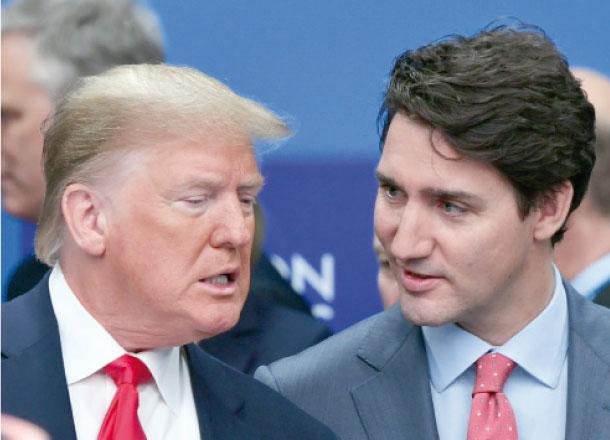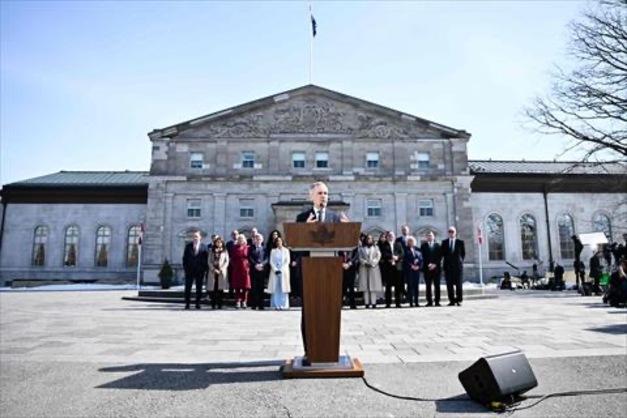You are here
Victorious but weakened, Trudeau needs help to form government
By AFP - Oct 22,2019 - Last updated at Oct 22,2019

Prime Minister Justin Trudeau celebrates his victory with his supporters at the Palais des Congres in Montreal during Team Justin Trudeau 2019 election night event in Montreal, Canada, on Monday (AFP photo)
OTTAWA — A weakened Prime Minister Justin Trudeau set out on Tuesday to secure the support of smaller parties he will need to form a government after winning Canada's nail-biter general election but falling short of a majority.
Trudeau's Liberals took 157 seats in the 338-member house of commons, down from a comfortable majority of 177 in the last one, official results showed.
Trudeau will thus have to seek some kind of accommodation with the Bloc Quebecois or the New Democratic Party.
Before launching talks with these parties Trudeau greeted people at a subway station in Montreal and posed smiling for selfies.
Trudeau received congratulations on Monday evening from US President Donald Trump and on Tuesday from European Council President Donald Tusk.
"From coast to coast to coast, tonight Canadians rejected division and negativity," Trudeau said in his victory speech on Monday night. "And they rejected cuts and austerity and voted in favour of a progressive agenda and strong action on climate change."
Even though he came out weakened, Trudeau did better than expected. Up until election day polls had him neck and neck with Conservative Party leader Andrew Scheer.
The Conservatives won 121 seats but beat the Liberals in the popular vote, taking 34.4 per cent to their 33.1 per cent. Scheer issued a warning to Trudeau.
"Canadians have passed judgement on [Trudeau's] Liberal government," noting that the Liberals shed more than 20 seats.
"We have put him on notice, his leadership is damaged and his government will end soon and when that time comes, the Conservatives will be ready and we will win!"
The first test of Trudeau's future government will follow in the coming weeks with a speech to parliament outlining his legislative priorities and a confidence vote.
For now he faces the tough task of forming a government, for which he will have to take into account the demands of minority parties.
Yves-Francois Blanchet, head of the Bloc Quebecois, a down and out party that scored a big comeback on Monday, said he can work with the new government if the interests of French-speaking Quebec are preserved.
'Open minds'
"If what is proposed is good for Quebec, you can count on us," said Blanchet, whose party will have 32 seats in the next legislature.
Jagmeet Singh, the leader of the New Democratic Party, promised to be constructive.
The leftist former criminal defence lawyer is the first non-white leader of a federal political party in Canada, and is now a kingmaker.
"In the days ahead, I'll be meeting with my new caucus, to talk about how we will deliver for people," Singh said in a statement.
"We'll approach building the new parliament with open minds and open hearts," he added.
He added: "The real winner of this election is not a party or a leader. Canadians sent a clear message: They want a government that works for them, and they are not satisfied with the old ways of doing politics."
Trudeau, a 47-year-old former school teacher, dominated Canadian politics over the four years of his first term, but faced a grilling during the 40-day election campaign, which he described as one of the "dirtiest and nastiest" in Canadian history.
Trudeau and Scheer exchanged barbs as attack ads and misinformation multiplied.
Trudeau evoked the bogeymen of past and current Tory parties fostering "politics of fear and division" while Scheer called the prime minister a "compulsive liar", "a phony and a fraud".
Going into the election Trudeau's golden boy image had already been damaged by ethics lapses in the handling of the bribery prosecution of engineering giant SNC-Lavalin. His popularity took a further hit with the emergence during the campaign of old photographs of him in blackface makeup.
Some 27.4 million Canadians were eligible to vote in the election, and the turnout was reported to have been large, at almost 65 per cent.
A record 97 women were elected to parliament, including Canada's first indigenous attorney general, Jody Wilson-Raybould, who ran as an independent candidate after Trudeau kicked her out of his caucus.
Related Articles
OTTAWA — Canadians began voting in a general election on Monday, with surveys predicting that Prime Minister Justin Trudeau's Liberal Party
OTTAWA — A chastened Canadian Prime Minister Justin Trudeau reconvened parliament on Thursday to unveil his legislative agenda in the first
OTTAWA — Canada's new Prime Minister Mark Carney on Friday launched his term in office with a whole-hearted rejection of US President Donald



















